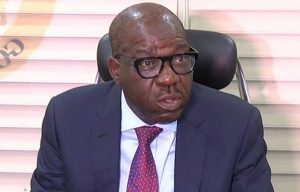Why CBN’s Liquidity Challenges Hampering Support for Naira–EIU

Market
Economist Intelligence Unit (EIU) has said that the Central Bank of Nigeria (CBN) faces a significant liquidity crisis in supporting the naira, as nearly $20 billion of its $33 billion in foreign reserves is tied up in various derivative deals.
EIU revealed this in its latest Country Report on Nigeria, highlighting the precarious position of the naira amidst rising inflation and policy decisions that may further affect the currency’s stability.
“The CBN lacks the liquidity to support the naira itself; out of US$33bn in foreign reserves, a large share (estimated at nearly US$20bn), is committed to various derivative deals”, it stated.
The EIU, however, suggested that foreign borrowing will be essential to rebuild the CBN’s reserves, clear backlogs of unmet foreign exchange orders, and restore confidence in the naira.
“Our view is that it will take foreign borrowing to rebuild the CBN’s buffers, fully clear a backlog of unmet foreign exchange orders and restore confidence. This is probably only achievable towards the end of 2024.”
It would be recalled that Nigeria has already taken steps in this direction, securing a $3.3 billion loan from the African Export-Import (Afrexim) Bank and a $1 billion loan from the African Development Bank, with an additional $1.5 billion sought from the World Bank.
The CBN is also working with the International Monetary Fund (IMF) to create a framework to address excess volatility in the forex market.
Projecting a gradual recovery of foreign reserves between 2024 and 2028, the EIU, suggests a a cautious outlook on the naira’s valuation. Due to a significant devaluation in early February, further depreciation is expected due to persistently high inflation and negative real short-term interest rates.
However, the report holds a balanced forecast, predicting an end-2024 rate of N1,770/$ and N1,817/$ by the end of 2025.
Despite this, concerns remain about the long-term value of the naira, with projections indicating a potential slide to N2,381/$ by 2028 and that the spread with the parallel market will be 5-15%, reflecting the impact of a lax monetary-fiscal policy mix and fluctuating world oil prices.
The report anticipates a volatile year for the naira, with potential regulatory changes that could impact businesses, especially in the face of foreign currency holdings.
The EIU had earlier said that the CBN lacks the firepower to clear the existing forex backlog and the experience to conduct a foreign currency float, leading to a negative outlook for the naira.
Nigeria has been grappling with foreign exchange illiquidity, which has slowed the CBN’s efforts to clear off its forex backlog, further worsening the value of its currency.
However, it appears that the recent reforms by the CBN have been productive in renewing investors’ interest in the country and attracting the needed foreign exchange.
The CBN recently said overseas remittances into the country rose to $1.3 billion in February 2024 compared to $300 million in the preceding month. Also, foreign investors purchased over $1 billion of Nigerian assets last month, with the total portfolio flows for the early part of 2024 reaching at least $2.3 billion, compared to the $3.9 billion recorded for the whole year in 2023.








